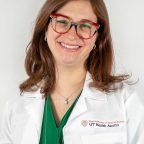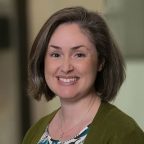In this short episode, Dr. Anna Capasso with the Livestrong Cancer Institutes talks about the basics of Colon Cancer for Colon Cancer Awareness Month, and she also reminds us of the importance of supporting the unique needs of each patient, beyond just treating the cancer itself, with a multidisciplinary team of clinicians.
Guests
 Anna CapassoMedical Oncologist in Gastrointestinal Cancer at the Livestrong Cancer Institutes
Anna CapassoMedical Oncologist in Gastrointestinal Cancer at the Livestrong Cancer Institutes
Hosts
 Kristen WynnSenior Administrative Program Coordinator at the Livestrong Cancer Institutes
Kristen WynnSenior Administrative Program Coordinator at the Livestrong Cancer Institutes
We are a resource for learners, including every member of the live strong cancer institutes on track educational pipeline from middle school to residency, we are a growing collection of interviews, talks and experiences, the uncover, the myths and the uncertainties of cancer and careers in cancer in order to empower and inspire generations of thinkers and leaders.
This is cancer. An education and empowerment podcasts by the live strong cancer institutes.
Welcome back to cancer uncovered. This is Kristin Wynn, senior program coordinator at the live strong cancer institutes here at Dell medical school at the university of Texas at Austin it’s March, which in Austin means the blue bonnets will be in bloom any moment. Now, south by Southwest is in town.
UT students are getting ready for a well-deserved spring break and it’s also colon cancer awareness. So who better to give us the basics on colon cancer? Then my favorite Italian gastrointestinal oncologist, Dr. Ana Capasso. If you haven’t heard from Dr. Capaso in episode four parts one and two a day in the life of a medical oncologist, I would strongly encourage you.
Take a listen and soon, Dr. Capasso is sure to be your favorite Italian gastrointestinal oncologist as well. Ana I’ll let you take it from. Yeah. So for rectal cancer, first of all, is one of the most commonly diagnosed cancers in the United States. And it’s basically a cancer that affects the up part of our digestive system.
The colon is in fact, the largest part of the large bowel that it’s sort of like a long tube shaped Oregon. Uh, so it’s responsible for basically breaking down the food in our body. So it’s basically part of the digestive system and colon cancer specifically is. Uh, a tumor that can arise in any part of the colon it’s bike.
As I said, it’s very common. So it’s probably the third, most common disease in the United States and second worldwide. And it’s actually the third, most common cause of death of within the cancer population. So it’s pretty common, unfortunately. How has it screened for Dr. Capasso? Yeah, so there is different ways of screening.
Good, but I believe that it’s really important for our listener to know that the gold standard for screening colorectal cancer aids actually colonoscopies endoscopy. That allows to go, as I said before, because of his long tube shaped Oregon, it live through the scope to go through the. Up and really like, sort of observed most of the corn up to the seek the best way, because we can have a direct visual image of the internal part of the tube.
So we can look with the camera. And if there’s like, you know, a lesion, the GI doctors can actually do a little biopsy and resect that area that can get out of there. And then we do serve life. What we call more pathology study of the Legion, and we can really study in details what the cell looked like.
You’re actually cancerous. So that’s where then we can intervene. And, and one of the very important thing is because now we’re seeing more younger people being affected. Most of the cancer societies have been changing the age at which we have to start screening. So before used to be 50 years old, now we went down to 45.
Um, if you have. Family history or any GI symptoms with bleeding or pain, that’s something that you would the point of report to your PCP or family doc? I can say one very important thing to share with our audience is that patient that already diagnosed with cancer go through so much. It’s really like a lion journey.
Some of them are curable and then they still need to be entry. And follow-up for five years after it, every diagnosis. And then hopefully they sort of graduate. Uh, but during those years there, there is like a lot of other issues that can arise. But this is where having a multi-disciplinary team that can not only take care of the cancer, but also as the person up.
And it’s really important for us to understand the needs of each patient individually, because that’s about quality of life. And so it’s really supporting their body in their mind. And then it’s really also important to consider that these people are part of the, like a bigger picture, like their loved ones, their families, their kids.
So they see, you know, they, their loved ones suffer suffering. That’s never easy. So I think we have to be very mindful of all those aspects. And I think it’s really important to spread it, not only to the colon cancer population, but all the cancer population. Uh, and I hope, you know, that we can really improve that in the clinical setting.
Because as I said at the beginning, The person and not about their cancer, they have to be identified as a person. And, uh, we try to do our best, but, uh, you know, getting informed then, you know, as a young adult or like a high score, middle school person might spreading the word, creating awareness. That’s very, very important.
I think it’s important for the people that don’t have cancer, but it’s even more important for those that are already affected because it can really make a change in everybody’s plan. I think it’s really nice for also like, you know, um, that our audience, to be able to know that they can always reach out to us and LCI it’s really invested not only in our patients, but also in educating the people in our community and all around us.
I think that’s really, um, sort of like a strong work that you guys are doing some it’s just like a great pleasure for me to be part of. Thank you, Dr. Ana Capaso physician and researcher with the live strong cancer institutes for your time and expertise. If you would like to do some more research about colon cancer.
Dr. Capasso recommends the American society of clinical oncology’s website or ASCO a S C o.org. The American cancer society. Cancer.org and the national cancer Institute, cancer.gov. Also have some really great, easy to read information specifically on colon and colorectal cancer. We hope you have enjoyed the short episode on colon cancer awareness.
Please stay tuned for a longer episode. Coming later this month on cancer, genomics, and whole person care with Dr. Jeanie Kowalski McGee. As Dr. Capaso mentioned, if you have questions for us about today’s episode, a previous episode, or you have an idea for a future episode, please email us@livestrongcancerinstitutesatdellmeddotutexas.edu.
To find out more about the live strong cancer institutes, please visit Dell med.uk. Dot EDU. This is Kristin when with the live strong cancer institutes for cancer uncovered and education and empowerment podcast. Thank you for listening and learning with us. .